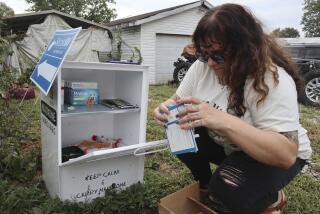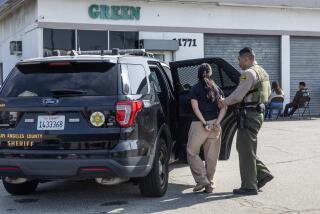Drug Dealers Finding They Can Invade Small-Town Turf for Big Profits
- Share via
Every few months the parcel truck would tool down the dusty road, carrying packages to the same house near the farm hamlet of Shellsburg, Iowa. Nothing seemed suspicious until authorities were tipped off about the contents.
It was cocaine, an informant said. After nearly two years of watching and waiting, two men were nabbed. The occupant of the house pleaded guilty to drug trafficking. A neighbor is expected to face trial this spring. Prosecutors say that in 15 months the two sold cocaine with a street value of $1.4 million.
The drug scourge that has ravaged many of the nation’s big cities is spreading to rural America. This incident is just one example. There are many.
Making More Arrests
Cocaine, speed, and even crack are becoming more common in corn country; drug labs and marijuana farms are reaping big profits in some tiny towns, and rural police and prosecutors are seizing more dope and arresting more dealers.
“In small rural communities you just don’t expect to find top quality dangerous drugs available in large quantities, and that’s what we’re finding,” said Paul Stevens, a Minnesota Bureau of Criminal Apprehension special agent. “We’re making undercover purchases in towns with populations of 50.”
“It used to be safe in a small town,” said Stevens, and parents didn’t have to worry because their children were far from dangerous drugs. “Now,” he said, “LSD, methamphetamines or pure cocaine are available to anyone to really looks for it.”
“You’re seeing it all over the country, and it’s finally coming to roost here,” added Stevens, an adviser to two Minnesota task forces investigating the spread of drug sales. “This is the end of the line.”
Will Hold Hearings
That not only concerns cops, but lawmakers including Iowa Sen. Charles E. Grassley, who plans to convene a hearing this year to examine the growing problem.
“What we’re finding is given the extra money a dealer can make in the state, it really behooves them to make inroads--and they are,” said Allen Finch, spokesman for the Republican senator.
Police say they are constantly surprised by the magnitude of the problem. Stevens said he was shocked when an informant--who had also been a dealer--recently said he had 50 cocaine customers in a small Minnesota town, but another dealer had 100.
Experts cite numerous reasons for drug dealing in small-town U.S.A.: a depressed rural economy, a ready market with less competition than big cities and an ideal environment--remote settings where neighbors may be miles away, police patrols are infrequent and cops often are undermanned and inexperienced handling such cases.
To be sure, the scope of the epidemic is minor compared to Miami’s cocaine battles, Los Angeles’ gang wars over drugs or Detroit’s flourishing crack trade.
Still, officials have seen Jamaican drug traffickers, Colombians and biker gangs expand their criminal enterprises from big cities into small towns in states such as West Virginia, Washington, Michigan, Iowa, Minnesota and Oregon.
Just Local Folks
Much of the drug dealing, though, is by local folks, sometimes unlikely ones.
A pig farmer near Strawberry Point, Iowa, was caught two years ago, trying to flee with “his overalls in one hand, a kilo of cocaine in another arm,” said Richard Murphy, an assistant U.S. attorney. The farmer was sleeping when authorities entered his house.
Sometimes, drug activity is concealed by transient populations in rural areas.
In Yakima, Wash., a cocaine distribution hub for the Pacific Northwest, the migrant worker system offers a cover for Mexican drug trafficking, said Robert Dreisbach, special agent in charge of the local Drug Enforcement Administration Office.
The traffickers “live in migrant farm areas, they have shacks,” said Dreisbach, noting that they sometimes coerce or hire migrants to transport their dope.
In other instances, remote locales provide the perfect opportunity to avoid detection, particularly with methamphetamine labs, which emit a cat-urine stench when producing a form of speed called “crank.” Such labs, often run by biker gangs, have been found from Missouri to Oregon.
‘Can Dump the Chemicals’
“They can get out into the wooded areas and away from the major cities so the smell does not become a problem,” said Gary Liming, DEA special agent in charge of a five-state Northwest region. “They can dump the chemicals out in the ground and streams.”
Authorities say they’ve stepped up enforcement efforts in rural areas and have results to prove it. For example:
- In Illinois, 83 people in largely rural Peoria, Knox and Tazewell counties were charged in 1988 in “Operation Iron Eagle.” Included were members of a biker group called the “Satan Brothers,” accused of dealing cocaine and methamphetamine. Almost all have pleaded guilty, said federal prosecutor Tate Chambers.
- In South Dakota, a mostly rural state, drug sale cases rose 50% in 1988, said Jerry Baum, director of the state Division of Criminal Investigation. He said 11.3 pounds of cocaine were seized last year, about five times the annual amount in previous years.
- In Iowa, 65 people were indicted in October and 14.5 pounds of cocaine, more than 500 pounds of marijuana and more than $300,000 was seized. Officials say two-thirds of those indicted were Iowans, including the Shellsburg area men and about 20 other rural residents. More than 55 of those charged have pleaded guilty or been convicted; the others face trial, Murphy said.
He also said drug prosecutions in his northern Iowa district doubled from 1986 to 1987 and again in the following year. “I think they (drug dealers) somehow have a false sense of security,” he said. “All they hear about enforcement efforts are in Miami, Los Angeles and Chicago.”
- In West Virginia, 33 people were convicted of or pleaded guilty to running a crack ring out of a rural shopping mall in Charles Town, about 80 miles from Washington, D.C. U.S. Atty. William Kolibash said crack, supplied by Jamaican dealers, was blatantly sold until arrests last year and the quiet county provided a safe haven for buyers and sellers.
“If you go into Washington, there’s probably somebody already there,” he said. “If you come into some (small) community, you can take it over and it’s yours to begin with.”
- In Yakima, Wash., the DEA office covering 11 largely rural counties made 143 arrests last year. “The only thing that keeps it from being greater is manpower and money,” Dreisbach said.
- In Georgia, three Americans and six Panamanians last year were convicted of or pleaded guilty to importing about 161 kilos of cocaine from Panama, via U.S. Army planes, commercial flights or mail packages sent to Moultrie, Ga. The drugs were then sent to New York, officials said. Three of the nine had Army ties.
Mail Deliveries
“This case is about as hometown as you can get,” said Bill Malarney, agent-in-charge of the DEA office in Columbus, Ga. “You’d expect a big city to have these problems. But this is a small southern town and here, you were having cocaine delivered in the mail!”
More to Read
Sign up for Essential California
The most important California stories and recommendations in your inbox every morning.
You may occasionally receive promotional content from the Los Angeles Times.













